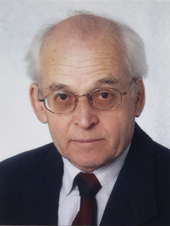On February 12, the Protestant theologian, social ethicist and social work scholar Prof. Dr. Ekkehard Börsch passed away at the age of almost 94. He taught and researched at the Protestant University of Applied Sciences in Ludwigshafen from 1971 to 1995.
Born in East Prussia in 1930, Ekkehard Börsch graduated from high school in Halle an der Saale in 1948 and began studying Protestant theology there. He fled the GDR in the spring of 1950 to continue his studies in Göttingen, Bonn and Basel. He completed his doctorate there in 1958/59 with Karl Barth on Luther and the enthusiasts. After his vicariate and second theological examination in West Berlin, Börsch trained as an industrial and social pastor at the Gossner Mission in Mainz under Horst Simanowski in 1959/60. In 1960/61, he worked at the Opel works in Rüsselsheim in all areas (assembly line, piecework, shift). In 1961, he was taken on by the Protestant Church in Hesse and Nassau to found the Church Service in the World of Work in Hesse as a pastor in Rüsselsheim. On a part-time basis, he taught industrial and labor sociology at the University of Applied Sciences for Engineering there. When the Fachhochschule der Pfälzischen Landeskirche was founded in Ludwigshafen am Rhein, Börsch was appointed professor in the winter semester of 1971/72, teaching social ethics, sociology, theology and work with foreigners. In addition to his education in the Social Work and Social Education degree programs, Börsch established Department III for Religious Education and Church Education Work, which was opened in 1973 with the degree program of the same name, and trained students as religious educators for parish work and school ministry until the end of the degree program in 1979. Börsch also taught social ethics at the University of Mainz from 1971 to 1981.
Together with others, Börsch founded social work research in the merger of the four Protestant universities of applied sciences in the southwest of Germany to form the so-called "Südwest-AG". From the end of the 1970s, Börsch was involved in the nationwide research project "Ausländerkinder" ("Foreign Children") of the Robert Bosch Foundation, which was endowed with one million DM, for the Protestant University of Applied Sciences Ludwigshafen in cooperation with the city, the Ludwigshafen Protestant Church and the Workers' Welfare Association. Börsch was involved in setting up the coordination office for work with foreigners in Ludwigshafen. The research project ended in 1983, many of the project measures were put into practice and the three project sponsors undertook to coordinate municipal work with foreigners in Ludwigshafen until 1986.
Börsch retired at the end of the 1994/95 winter semester. Since then, the emeritus has been in charge of the "School and Youth Welfare" project in the city of Ludwigshafen on a voluntary basis for seven years, with which he developed fundamental concepts for school social work. During this time, he also published several essays on the theology of his academic education teacher Hans Iwand and in 1998 published the first volume of Iwand's posthumous works (Neue Folge) under the title "Kirche und Gesellschaft" (Church and Society) with Kaiser-Verlag in Gütersloh. Börsch had been active as a church organist and played the piano since his student years.
As a university lecturer in Ludwigshafen, the Protestant theologian and social ethicist Ekkehard Börsch developed his own social and professional ethics for social work. In dialog with the other sciences, he implemented them scientifically and curricularly in education, research and further training.
Throughout his time as a professor, Börsch formulated and shaped the specific theological profile of his teaching areas and the Protestant University of Applied Sciences. He was regarded by students and colleagues as a critical Protestant, a convincing university lecturer, a diligent social and theological researcher and a well-educated intellectual. In countless publications, he dealt with the significance of Protestant theology and social ethics for the church and social welfare, for the workforce and trade unions, for industrial society and social work.
Prof. Dr. Arnd Götzelmann for the HWG LU





